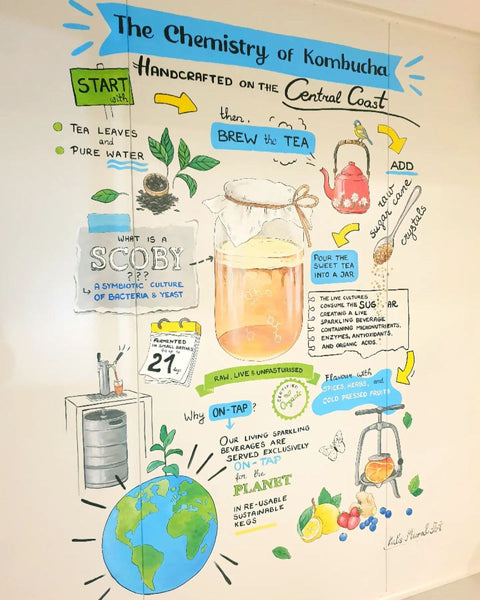What is Kombucha?
Kombucha is a fermented tea drink that has been brewed throughout the world, from South America to Europe and beyond, for hundreds of years, with origins in Asia. Traditionally it has been a drink prepared and consumed in the home with tea leaves, sugar and a synergistic blend of live cultures that creates a tart, sparkling and refreshing pick-me-up drink.
The live cultures in Kombucha consist of various yeast species that convert sugars into alcohol and carbon dioxide and live beneficial bacteria species that then convert the small quantities of alcohol into acetic and other organic acids.
Kombucha is famously known for the SCOBY, a thin cellulose layer that forms on the top of the brewing drink by the cultures to protect the contents beneath.
SCOBY stands for
Symbiotic
Culture Of
Bacteria and
Yeast
Benefits of Kombucha include:
Digestion aid: As a fermented food, Kombucha contains nutrients such as vitamins, enzymes and acids created and unlocked by the live cultures that can promote health. The organic acids produced by Kombucha can aid digestion when sipped on during a meal.
Energy: Authentic Kombucha contains the well-known stimulant caffeine from the tea and residual sugars for an excellent energising post-workout or mid-afternoon boost. The majority of sugar leftover in Kombucha after fermentation has been naturally broken down by enzymes and is found in the form of glucose which our brain uses as a fuel source and fructose.
Antioxidants: The characterising ingredient in Kombucha, tea leaves, supplies all the well-known beneficial compounds found in tea, L-Theanine, to promote calmness and antioxidants called Catechins that have antioxidant and anti-inflammatory properties.
Antimicrobial: Kombucha is known for its antimicrobial properties. The cultures produce a range of organic acids, which stops the fermenting brew from being invaded by other undesirable microorganisms. The low pH of Kombucha helps keep it safe from infection and the growth of common foodborne pathogens.
Detoxification: One of the beneficial acids produced by Kombucha is Glucuronic acid. Glucuronic acid has been shown to assist in liver detoxification as it can bind and aid the elimination of toxins from the body. This article in the CyTA - Journal of Food Volume 16, 2018 - Issue 1 explains the detoxifying role of Glucuronic acid and other benefits associated with Kombucha in more detail.
How can you determine what is a good kombucha to drink?
.jpg) At Zentient Culture, we're passionate about authentic Kombucha. With no identity standards for Kombucha in Australia, it's important consumers know exactly what they are purchasing. The Food Standards Code for Australia & New Zealand FAZANZ, has identity standards for many foods, specifying, for example, what a 'Juice', 'Cheese' or 'Beer' must contain to be called these products.
At Zentient Culture, we're passionate about authentic Kombucha. With no identity standards for Kombucha in Australia, it's important consumers know exactly what they are purchasing. The Food Standards Code for Australia & New Zealand FAZANZ, has identity standards for many foods, specifying, for example, what a 'Juice', 'Cheese' or 'Beer' must contain to be called these products.
Currently, there is no definition and minimum requirements set for 'Kombucha' under the code. As such, it's up to businesses' interpretation, discretion and choice, which has led to less than authentic beverages in the marketplace being labelled 'Kombucha'.
Pasteurisation to kill off the live cultures and extend shelf-life and dilution of Kombucha with water to create an ultra-low sugar product with high-intensity sweeteners added are all ways to create cost-saving shelf-stable drinks. Convenient perhaps, but not authentic. Zentient Culture Kombucha is raw and unpasteurised, not made from a concentrate, or diluted, meaning it's the fully functional real deal, complete with live cultures! Check out our fantastic Kombucha infographic on our Central Coast-based taproom wall during your next visit to learn more about the authentic Kombucha making process!
Roger Elfenbein
Food Scientist & Founder of Zentient Culture Kombucha On-Tap
E: info@zentientculture.com.au
Learn more about our story at www.zentientculture.com.au


